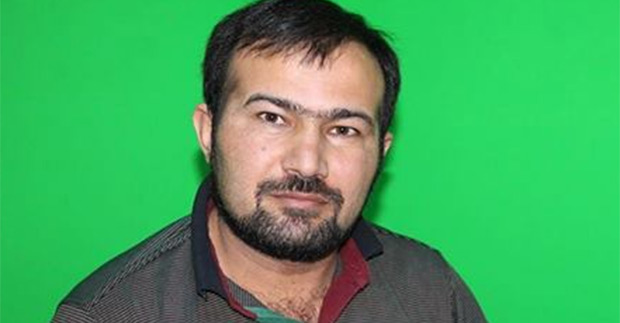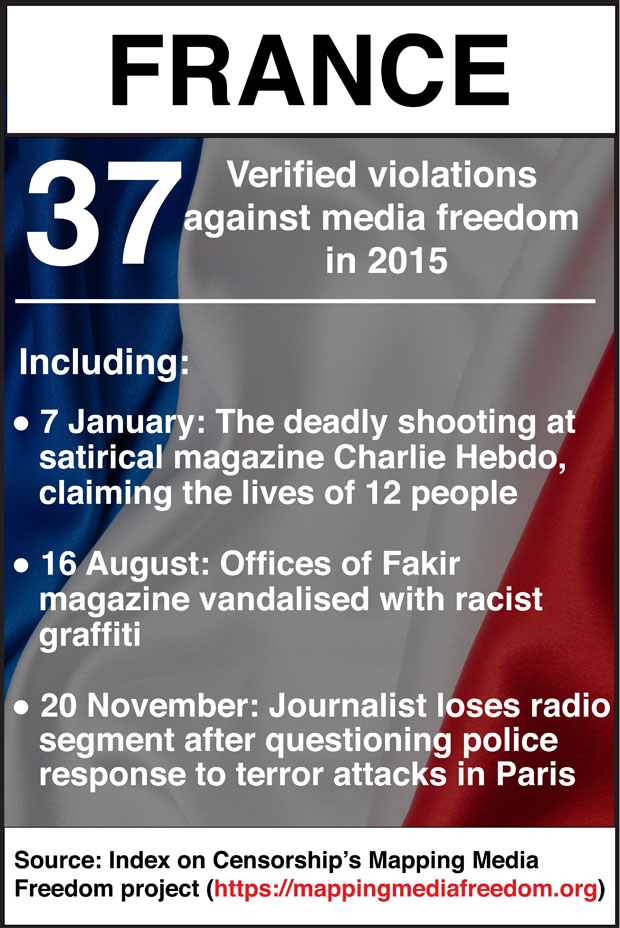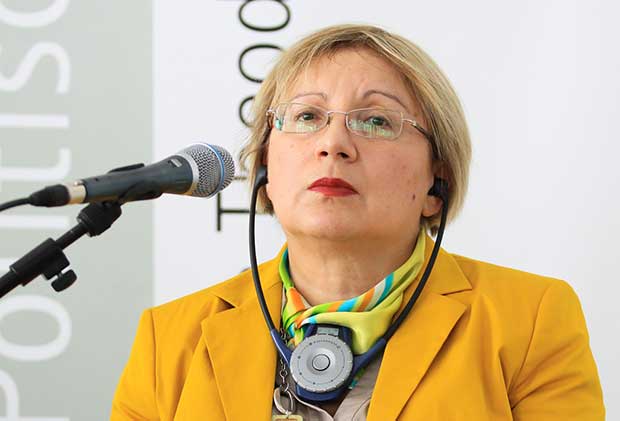29 Jan 2016 | Azerbaijan, Azerbaijan News, mobile, News and features

Seymur Hezi was sentenced to five years in prison for “aggravated hooliganism” on 29 January 2015.
On the anniversary of Azerbaijani journalist Seymur Hezi’s sentencing to five years imprisonment for “aggravated hooliganism,” the country’s authorities have continued to target journalists, independent media and human rights activists.
Hezi, who contributed to the Index on Censorship Freedom of Expression Award-winning newspaper Azadliq, was sentenced on 29 January 2015. He was arrested on 29 August 2014 following an altercation in which the journalist was defending himself from a physical assault and harassment, according to his lawyers.
Rahim Haciyev, acting editor of Azadliq, told Index in September 2015 Hezi’s prosecution was due to his critical articles of the Azerbaijan authorities in the newspaper, as well as critiques he had made in his online TV programme, Azerbaijan Hour.
Haciyev said Hezi’s health is “very bad” due to the Azerbaijan’s awful prison conditions. Despite this, he said the journalist is working on articles about the country’s recent political history — some of which have been published in Azadliq.
In Hezi’s final statement given during his trial, he noted his belief in the shared struggle “with my dear friends at prison”. He also said: “It is not just a confrontation between the government and the opposition. It is the struggle between the good and the evil.”
After a year activism and journalism dedicated to free expression within the restricting country, not much positive change can be seen. Investigative journalist Khadija Ismayilova remains in jail, doing everything in her power to continue spreading the message of truth and resistance. Human rights lawyer Amal Clooney recently offered to take Ismayilova’s case to the European Court of Human Rights.
Azadliq, which was one of Azerbaijan’s only remaining independent news outlets operating inside the country, was forced to discontinue publishing a daily print edition of the newspaper in July 2014, due to its financial situation. The paper was hit with enormous fines following multiple defamation suits in 2013, and its journalists — including Hezi — have been targeted by authorities with politically motivated charges.
“The repression and detainment of journalists are continuing,” Haciyev said. “[The] government has started to arrest Facebook activists.”
Haciyev said that because the government cannot solve its country’s main problems, they try to create new problems for society through eliminating any chance of other opinions being promoted.
This article was originally posted to Index on Censorship
7 Jan 2016 | France, Mapping Media Freedom, News and features, Statements, United Kingdom

When I started working at Index on Censorship, some friends (including some journalists) asked why an organisation defending free expression was needed in the 21st century. “We’ve won the battle,” was a phrase I heard often. “We have free speech.”
There was another group who recognised that there are many places in the world where speech is curbed (North Korea was mentioned a lot), but most refused to accept that any threat existed in modern, liberal democracies.
After the killing of 12 people at the offices of French satirical magazine Charlie Hebdo, that argument died away. The threats that Index sees every day – in Bangladesh, in Iran, in Mexico, the threats to poets, playwrights, singers, journalists and artists – had come to Paris. And so, by extension, to all of us.
Those to whom I had struggled to explain the creeping forms of censorship that are increasingly restraining our freedom to express ourselves – a freedom which for me forms the bedrock of all other liberties and which is essential for a tolerant, progressive society – found their voice. Suddenly, everyone was “Charlie”, declaring their support for a value whose worth they had, in the preceding months, seemingly barely understood, and certainly saw no reason to defend.
The heartfelt response to the brutal murders at Charlie Hebdo was strong and felt like it came from a united voice. If one good thing could come out of such killings, I thought, it would be that people would start to take more seriously what it means to believe that everyone should have the right to speak freely. Perhaps more attention would fall on those whose speech is being curbed on a daily basis elsewhere in the world: the murders of atheist bloggers in Bangladesh, the detention of journalists in Azerbaijan, the crackdown on media in Turkey. Perhaps this new-found interest in free expression – and its value – would also help to reignite debate in the UK, France and other democracies about the growing curbs on free speech: the banning of speakers on university campuses, the laws being drafted that are meant to stop terrorism but which can catch anyone with whom the government disagrees, the individuals jailed for making jokes.
And, in a way, this did happen. At least, free expression was “in vogue” for much of 2015. University debating societies wanted to discuss its limits, plays were written about censorship and the arts, funds raised to keep Charlie Hebdo going in defiance against those who would use the “assassin’s veto” to stop them. It was also a tense year. Events discussing hate speech or cartooning for which six months previously we might have struggled to get an audience were now being held to full houses. But they were also marked by the presence of police, security guards and patrol cars. I attended one seminar at which a participant was accompanied at all times by two bodyguards. Newspapers and magazines across London conducted security reviews.
But after the dust settled, after the initial rush of apparent solidarity, it became clear that very few people were actually for free speech in the way we understand it at Index. The “buts” crept quickly in – no one would condone violence to deal with troublesome speech, but many were ready to defend a raft of curbs on speech deemed to be offensive, or found they could only defend certain kinds of speech. The PEN American Center, which defends the freedom to write and read, discovered this in May when it awarded Charlie Hebdo a courage award and a number of novelists withdrew from the gala ceremony. Many said they felt uncomfortable giving an award to a publication that drew crude caricatures and mocked religion.

Index’s project Mapping Media Freedom recorded 745 violations against media freedom across Europe in 2015.
The problem with the reaction of the PEN novelists is that it sends the same message as that used by the violent fundamentalists: that only some kinds of speech are worth defending. But if free speech is to mean anything at all, then we must extend the same privileges to speech we dislike as to that of which we approve. We cannot qualify this freedom with caveats about the quality of the art, or the acceptability of the views. Because once you start down that route, all speech is fair game for censorship – including your own.
As Neil Gaiman, the writer who stepped in to host one of the tables at the ceremony after others pulled out, once said: “…if you don’t stand up for the stuff you don’t like, when they come for the stuff you do like, you’ve already lost.”
Index believes that speech and expression should be curbed only when it incites violence. Defending this position is not easy. It means you find yourself having to defend the speech rights of religious bigots, racists, misogynists and a whole panoply of people with unpalatable views. But if we don’t do that, why should the rights of those who speak out against such people be defended?
In 2016, if we are to defend free expression we need to do a few things. Firstly, we need to stop banning stuff. Sometimes when I look around at the barrage of calls for various people to be silenced (Donald Trump, Germaine Greer, Maryam Namazie) I feel like I’m in that scene from the film Lock, Stock and Two Smoking Barrels where a bunch of gangsters keep firing at each other by accident and one finally shouts: “Could everyone stop getting shot?” Instead of demanding that people be prevented from speaking on campus, debate them, argue back, expose the holes in their rhetoric and the flaws in their logic.
Secondly, we need to give people the tools for that fight. If you believe as I do that the free flow of ideas and opinions – as opposed to banning things – is ultimately what builds a more tolerant society, then everyone needs to be able to express themselves. One of the arguments used often in the wake of Charlie Hebdo to potentially excuse, or at least explain, what the gunmen did is that the Muslim community in France lacks a voice in mainstream media. Into this vacuum, poisonous and misrepresentative ideas that perpetuate stereotypes and exacerbate hatreds can flourish. The person with the microphone, the pen or the printing press has power over those without.
It is important not to dismiss these arguments but it is vital that the response is not to censor the speaker, the writer or the publisher. Ideas are not challenged by hiding them away and minds not changed by silence. Efforts that encourage diversity in media coverage, representation and decision-making are a good place to start.
Finally, as the reaction to the killings in Paris in November showed, solidarity makes a difference: we need to stand up to the bullies together. When Index called for republication of Charlie Hebdo’s cartoons shortly after the attacks, we wanted to show that publishers and free expression groups were united not by a political philosophy, but by an unwillingness to be cowed by bullies. Fear isolates the brave – and it makes the courageous targets for attack. We saw this clearly in the days after Charlie Hebdo when British newspapers and broadcasters shied away from publishing any of the cartoons featuring the Prophet Mohammed. We need to act together in speaking out against those who would use violence to silence us.
As we see this week, threats against freedom of expression in Europe come in all shapes and sizes. The Polish government’s plans to appoint the heads of public broadcasters has drawn complaints to the Council of Europe from journalism bodies, including Index, who argue that the changes would be “wholly unacceptable in a genuine democracy”.
In the UK, plans are afoot to curb speech in the name of protecting us from terror but which are likely to have far-reaching repercussions for all. Index, along with colleagues at English PEN, the National Secular Society and the Christian Institute will be working to ensure that doesn’t happen. This year, as every year, defending free speech will begin at home.
11 Dec 2015 | Azerbaijan, Azerbaijan Statements, Campaigns, Europe and Central Asia, mobile

Leyla Yunus (Photo: Human Rights Watch)
We — members of the Civic Solidarity Platform and the Sports For Rights Campaign — were relieved to learn that one of Azerbaijan’s most well-known political prisoners, Leyla Yunus, was released from detention yesterday and that that the Baku City Court of Appeal changed her sentence and that of her husband Arif into suspended sentences of 5 years, on probation. However, most of the charges against the couple have not been dropped and, while on probation, Leyla and Arif Yunus will not be able to leave the country. We remain seriously concerned about the state of health of Leyla Yunus, who has been diagnosed with diabetes and hepatitis C, and that of Arif Yunus, who suffers from high blood pressure. There are doubts that adequate medical assistance can be provided to Leyla Yunus in Azerbaijan.
As part of the ongoing civil society crackdown in Azerbaijan, Leyla and her husband Arif were arrested in late July and early August 2014, respectively. On 13 August 2015, they were convicted on charges of large‑scale fraud and tax evasion. Leyla was sentenced to 8.5 years in prison and Arif to 7 years. While in detention, they were humiliated by police officers, put in overcrowded cells, beaten several times and deprived of much needed medical treatment. On 13 November 2015, Arif Yunus was released under house arrest on health grounds. When ruling to change the sentences, the court of appeal dropped the charges of forgery, but retained others. The court also lifted the order to seize the house owned by the couple.
We, members of the Civic Solidarity Platform and the Sports for Rights Campaign, consider the new developments in the case of Arif and Leyla Yunus to be positive and a first step in the right direction. However, we continue to call for all charges against the couple to be dropped. Leyla Yunus requires an urgent medical examination and she should be granted the right to receive medical treatment abroad if necessary. Arif Yunus must also be provided with swift and adequate medical assistance.
Leyla and Arif Yunus are not the only political prisoners in Azerbaijan. Dozens of other civil society activists, human rights lawyers and journalists remain in detention or prison in Azerbaijan solely due to their professional activities and the peaceful and legitimate exercise of their fundamental rights and freedoms. They should be immediately and unconditionally released. The Azerbaijani government must respect its commitments before its own people, as well as its obligations under international human rights law.
Signed by:
Analytical Center for Interethnic Cooperation and Consultations
Article 19
Association UMDPL
Bulgarian Helsinki Committee
Baris Zvozkau Belarusian Human Rights House
Center for Civil liberties
Center for the Development of Democracy and Human Rights
Crude Accountability
Freedom Files
Helsinki Committee for Human Rights in Serbia
Helsinki Foundation for Human Rights
Human Rights House Foundation
Human Rights Monitoring Institute
Human Rights Movement “Bir Duino-Kyrgyzstan”
Index on Censorship
International Federation for Human Rights (FIDH)
International Partnership for Human Rights
Kazakhstan International Bureau for Human Rights and Rule of Law
Kosova Rehabilitation Centre for Torture Victims
KRF Public Alternative
Legal Transformation Center
Moscow Helsinki Group
Netherlands Helsinki Committee
Norwegian Helsinki Committee
Nota Bene
Promo LEX
Public Verdict Foundation
SOVA Center for Information and Analyses
Sports For Rights
Swiss Helsinki Committee
World Organization against Torture (OMCT)
4 Dec 2015 | Azerbaijan, Azerbaijan News, Campaigns, mobile

Khadija Ismayilova
On the eve of the anniversary of the arrest of journalist Khadija Ismayilova, members of the Sport for Rights coalition and the Civic Solidarity Platform underscore the unprecedented nature of the repression that has taken place in Azerbaijan in the year that has passed. The groups reiterate their call for the immediate and unconditional release of Ismayilova and Azerbaijan’s other political prisoners, and for the international community to take steps to hold the Azerbaijani government accountable for its human rights obligations as matter of urgent priority.
“Ismayilova’s arrest a year ago signalled an escalation of repression in Azerbaijan”, noted Karin Deutsch Karlekar, Director of Free Expression Programs at PEN American Center. “Independent voices are being silenced at an unprecedented rate, and we urge the authorities to cease the legal and extra-legal harassment of journalists and media outlets immediately”.
On 5 December 2014, prominent investigative journalist Khadija Ismayilova was arrested on charges of inciting a local man, Tural Mustafayev, to attempt suicide. Two months later, authorities slammed her with additional politicised charges of embezzlement, illegal business, tax evasion, and abuse of power. After eight months in pre-trial detention, Ismayilova’s trial started on 7 August at the Baku Court of Grave Crimes.
Ismayilova referred to the proceedings as an “express trial”, and observers noted it was rife with due process violations, with the judges rarely granting any motions made by the defence. During the trial, Mustafayev publicly told the court that prosecutors forced him to make a statement against Ismayilova, and withdrew his accusations. Additionally, Ismayilova’s lawyer told the court that her employer did not report any funds missing, that she was not authorised to hire or dismiss other journalists, and that she was not engaged in any commercial enterprise.
On 1 September, the court convicted Ismayilova of the charges of embezzlement, illegal entrepreneurship, tax evasion, and abuse of office, and sentenced her to 7.5 years’ imprisonment. She was acquitted of the charge of inciting Mustafayev to attempt suicide. On 25 November, the Baku Court of Appeals upheld this conviction, and Ismayilova was transferred to Prison Number 4 on 27 November.
Sport for Rights considers the charges against Ismayilova to be politically motivated and connected to her work as an investigative journalist, particularly her exposure of corruption among the ruling elite. Sport for Rights believes that in jailing Ismayilova, the Azerbaijani authorities sought to silence her critical voice before the country faced increased international media attention during the inaugural European Games, which took place in Baku in June. For this reason, Sport for Rights has referred to Ismayilova as a “Prisoner of the Games”.
“Ismayilova’s imprisonment is emblematic of the Azerbaijani authorities’ repression of independent journalists and human rights defenders”, said Melody Patry, Senior Advocacy Officer at Index on Censorship. “Every day Ismayilova and the other political prisoners spend in jail is another reminder to the world that the Azerbaijani government fails to respect and protect the democratic principles and fundamental rights it has committed to upholding”.
Ismayilova is one of dozens of political prisoners in Azerbaijan. Other prominent cases include journalists Nijat Aliyev, Araz Guliyev, Parviz Hashimli, Seymur Hezi, Hilal Mammadov, Rauf Mirkadirov, and Tofig Yagublu; bloggers Abdul Abilov, Faraj Karimli, Omar Mammadov, Rashad Ramazanov, and Ilkin Rustamzade; human rights defenders Intigam Aliyev, Rasul Jafarov, Taleh Khasmammadov, Anar Mammadli, Arif Yunus, and Leyla Yunus; NIDA civic movement activists Rashadat Akundov, Mammad Azizov, and Rashad Hasanov; opposition activist Yadigar Sadikhov; and opposition REAL movement chairman Ilgar Mammadov.
Besides politically motivated arrests and imprisonment, the Azerbaijani authorities continue to employ a wide range of tactics as part of an aggressive crackdown to silence the country’s few remaining critical voices. Independent online television station Meydan TV has been a particular target, with its staff and their relatives threatened, detained, and otherwise pressured in connection with Meydan TV’s critical news coverage of Azerbaijan. Other independent NGOs and media including the Institute for Reporters’ Freedom and Safety and its online television project Obyektiv TV, as well as Radio Free Europe/Radio Liberty’s Baku office, have also been aggressively targeted over the past year.
In addition to the post-European Games crackdown, the Azerbaijani authorities also worked to silence criticism ahead of the 1 November parliamentary elections. For the first time, the elections took place with almost no credible international observers, and with the majority of the traditional opposition boycotting. Independent domestic observers reported widespread fraud, such as carousel voting and irregularities in the vote counting and tabulation process. Now, in the run-up to the Formula One European Grand Prix, which will take place in Baku in June 2016, the crackdown shows no signs of relenting.
These issues and more are detailed in a new Sport for Rights report, No Holds Barred: Azerbaijan’s Human Rights Crackdown in Aliyev’s Third Term, which also contains specific recommendations to the Azerbaijani authorities and the international community on urgent measures needed to improve the dire human rights situation in the country. Sport for Rights and the Civic Solidarity Platform particularly urge the international community to sustain focus on Azerbaijan over the coming months, when critical voices will need concrete support more than ever before.
Supporting organisations:
ARTICLE 19
Association of Ukrainian Human Rights Monitors on Law Enforcement
Canadian Journalists for Free Expression
Center for Civil Liberties (Ukraine)
Centre for the Development of Democracy and Human Rights (Russia)
Civil Rights Defenders
Committee to Protect Journalists
Crude Accountability
Freedom Now
Front Line Defenders
Georgian Young Lawyers’ Association
Golos Svobody Public Foundation (Kyrgyzstan)
Human Rights House Foundation
Human Rights Movement “Bir Duino-Kyrgyzstan”
Index on Censorship
Institute for Reporters’ Freedom and Safety
International Federation for Human Rights (FIDH), within the framework of the
Observatory for the Protection of Human Rights Defenders
International Partnership for Human Rights
Kazakhstan International Bureau for Human Rights and Rule of Law
Kharkiv Regional Foundation – Public Alternative (Ukraine)
Kosova Rehabilitation Centre for Torture Victims
Norwegian Helsinki Committee
PEN American Center
People In Need
Platform
Promo-LEX (Moldova)
Public Verdict Foundation (Russia)
Reporters Without Borders
Sova Center for Information and Analysis (Russia)
World Organisation Against Torture (OMCT), within the framework of the
Observatory for the Protection of Human Rights Defenders





